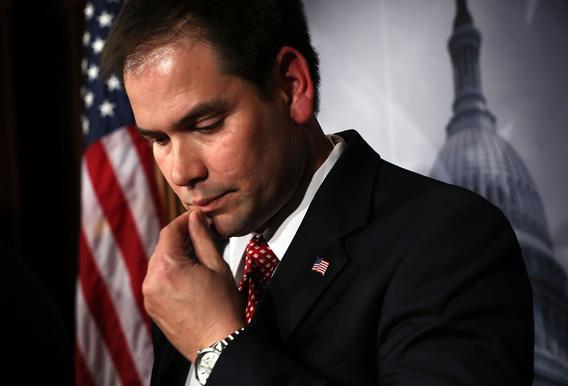Sen. Marco Rubio is having a moment. He’s a charismatic senator from a battleground state whose Cuban heritage and support for immigration reform are helping his party begin a new courtship with Hispanic voters. This much we know. But Rubio is exploiting an opportunity that goes beyond simply good timing and the right last name. He is getting the chance to be first at bat in a larger effort: the post-election audition for GOP leadership. Of all the would-be Republican stars—and the list is long and likely to grow—Rubio is getting a chance to show exactly what it looks like to move the party in a new direction.
Lots of conservatives are giving advice about how the Republican Party can evolve after the 2012 election. Paul Ryan, Bobby Jindal, Charles Krauthammer, and the National Review have all weighed in with a message of principle mixed with prudence. That’s just talk. Rubio has given his speech about party direction, too. But he’s now getting a chance to demonstrate some important political skills beyond speech-making that show whether he can actually help steer the new course, not just call for one. This is the first test of the New Year’s resolutions.
Senators—particularly freshman senators with no executive experience—don’t get a lot of opportunities to show their skills in action. In the sweepstakes to be a national Republican leader—and then possible presidential candidate—the advantage usually goes to the governors. They can take actions that show tangible results while distancing themselves from a deeply unpopular Washington. Chris Christie and Bobby Jindal are both taking this approach. Christie’s Boehner bashing and leadership in the aftermath of Hurricane Sandy has helped drive the New Jersey governor’s approval ratings skyward.
The most important political skill is midwifery. The leader who moves the Republican Party into a new era, where it is more attractive to middle-class voters, minorities, and younger voters, will need to communicate a vision as well as communicate back to the base how he is not selling out the party’s core principles. In this effort, Rubio will get a crack at showing key presidential governing skills—the ability to nurse complex legislation by identifying common interests with Democrats while working with Republicans friends through a mixture of cajoling, flattery, and strong-arming.
Some might think Rubio’s moment isn’t a real test. The GOP needs to improve its image, and he’s got the background to do it. Sure, after the 2012 election, some conservative elites switched their position on immigration reforms—Sean Hannity setting the land-speed record—and that makes Rubio’s pitch easier. But maintenance of long-held truths in the face of the crowd’s push for “progress” is among the highest of conservative attributes. And there are plenty of other influential voices and activists who think principles don’t change just because the elections don’t go well. There is opposition from Erick Erickson at Red State, former House Judiciary Committee chairman Lamar Smith, and Rush Limbaugh. As Bryan Fischer of the American Family Association put it, playing off of the famous William F. Buckley line, “On immigration, it’s time for conservatives to stand athwart Marco Rubio and yell, ‘Stop!’ ” And on Wednesday Sen. David Vitter told conservative radio show host Laura Ingraham that Rubio is “amazingly naive” and “nuts” for supporting the “ridiculous” bipartisan immigration reform proposal.
More broadly, there is skepticism even about the political imperative that underlies the new push. Rush Limbaugh argues that Hispanic votes can never be won because they are addicted to social welfare. Rep. Lou Barletta of Pennsylvania made a similar case recently. They have a point about the relationship of Hispanic voters to GOP philosophy. Rubio must convince that audience—and the activist viewpoint they represent—of the merits of his new approach that go beyond political expediency.
In this, Rubio’s task is a microcosm of the larger task all would-be national leaders are assigning themselves as the GOP tries to reverse the trend that has led to five popular-vote losses in the last six elections: How do you adapt without changing? That’s why Rubio’s conversation about immigration quickly morphs into his pitch for limited government.
Rubio is quick on his feet, and he’ll need to be to manage two tough tasks: keeping his membership in the bipartisan “gang of eight” that includes liberal Sens. Chuck Schumer and Robert Menendez while also keeping the promises he has been making on talk radio. When Sen. Barack Obama tried this during negotiations over a lobbying and ethics bill with John McCain, the effort collapsed. Whether it was because Sen. Obama couldn’t buck his party leaders or because McCain simply didn’t trust him, Obama was unable to pull off the same trick that Rubio is now trying.
Marco Rubio doesn’t have to succeed fully either. Or, more precisely, success for comprehensive immigration reform is not the same as success for Marco Rubio. Legislative accomplishment may burnish Rubio’s image with a broader electorate, but that’s not his only constituency. He’s building relationships with conservatives that will pay off down the road on a host of other issues. If he withdraws his support of the Senate effort as it goes forward—as Conn Carroll suggests he might—Rubio will show that new prudence doesn’t just mean caving. In the long grope for a new direction, avoiding the new wrong way may serve Rubio’s long-term political interests just fine.
